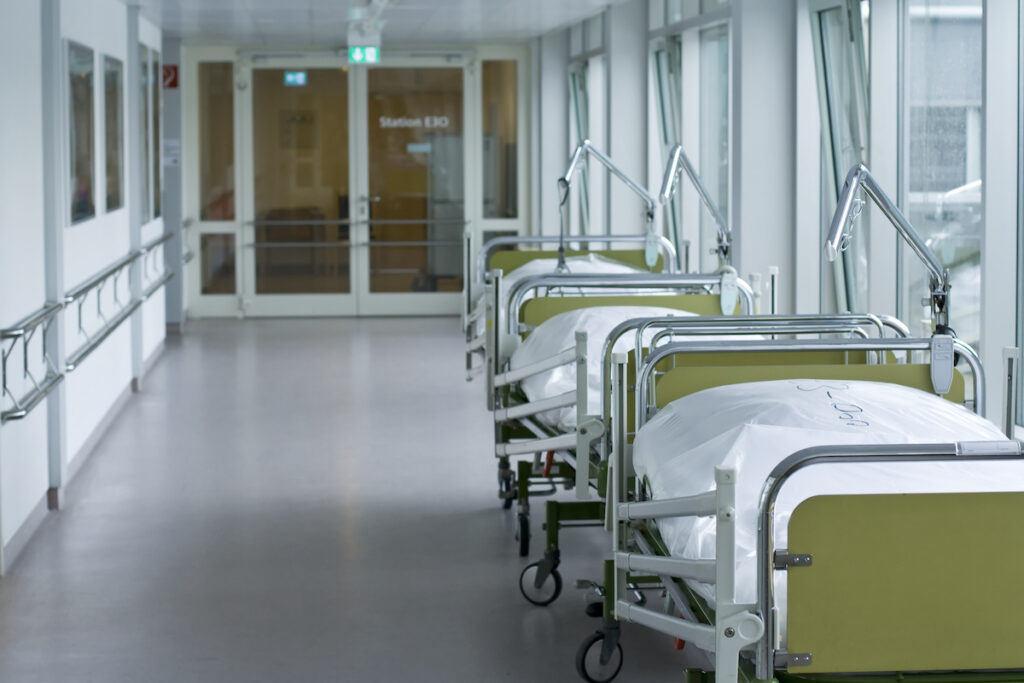Data scientists assist NHS Lanarkshire to manage intensive care bed demand

Data scientists at the University of Strathclyde helped NHS Lanarkshire to predict and manage hospital bed capacity © OxfordSquare / Shutterstock
Data scientists at the University of Strathclyde helped NHS Lanarkshire to predict and manage hospital bed capacity for COVID-19 patients during the most critical phase of the current pandemic.
The University was commissioned by the Health Board in early March to develop a model to help it plan and manage demand for critical care and general ward beds across the three main Lanarkshire hospitals.
A team from the Department of Management Science, led by Dr Robert Van Der Meer, developed an integrated spreadsheet and discrete event simulation model, yielding week-to-week predictions of the number of critical care and other hospital beds required as the early wave of COVID-19 patients was rapidly building up.
Detailed data fed into the model include age group demographics and estimated prevalence of co-morbidities in the regional population, as well as the number and type of available hospital beds. A critical variable was the expected length of hospital stay of COVID-19 patients, for which the team developed accurate estimates based on local data.
The modelling effort reached a critical phase in the last week of March and first week of April, when there was considerable anxiety across NHS Scotland whether the amount of critical care facilities then available – already greatly increased by repurposing as many other hospital resources as possible – would be sufficient to cope with the seemingly ever-growing influx of COVID-19 patients.
However, the Strathclyde team was able to predict – accurately as it turned out – that the intense pressure from COVID-19 would reach a peak during the first two weeks of April and that enough critical care and other beds were available to cope with this.
A detailed report was presented to the Corporate Management Team of NHS Lanarkshire on 6 April. The Strathclyde report was subsequently widely shared with other Health Boards and the Scottish Government.
Dr Van Der Meer said: “The Strathclyde model gives NHS Lanarkshire week-by-week predictions on how many patients will need to be admitted with COVID-19, and how many of these patients need to receive critical care including ventilation, and how long for.
“In this way, we could estimate the maximum bed utilisation before, during and after the peak of the COVID-19 wave in April and reassure the Health Board that they had sufficient capacity. Our model demonstrated the predictive validity needed for effective decision support.”
Calum Campbell, Chief Executive of NHS Lanarkshire, said: “It was vital that we had the bed capacity across NHS Lanarkshire’s three acute hospitals to cope with the demands of COVID-19 during these unprecedented times.
We really appreciate the invaluable input from the data scientists at University of Strathclyde that helped ensure we were well prepared to deal with that demand.”
The Strathclyde research team – which also includes Gillian Anderson, Chandrava Sinha and Holly McCabe, replacing Dr Nicola Irvine – are now developing their model to support of the recovery and, where desirable and possible, redesign of care for non-coronavirus conditions, while keeping a close eye on the possibility of a new wave in the COVID-19 pandemic this year.
The effective use of the Strathclyde model has received significant recognition across NHS Scotland and the Scottish Government. Dr Van Der Meer has recently been invited to join a new COVID-19 Modelling Oversight Group, set up by Public Health Scotland to bring together modelling experts from NHS Scotland, Scottish Government and academia.